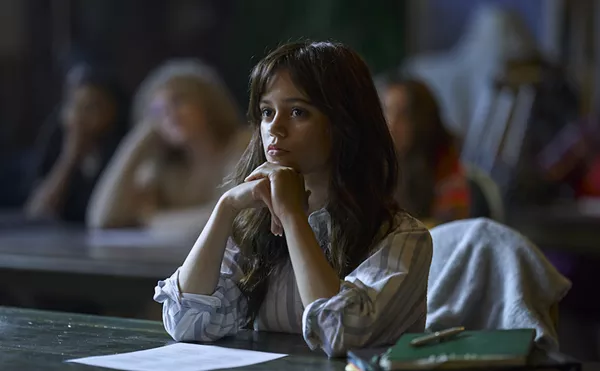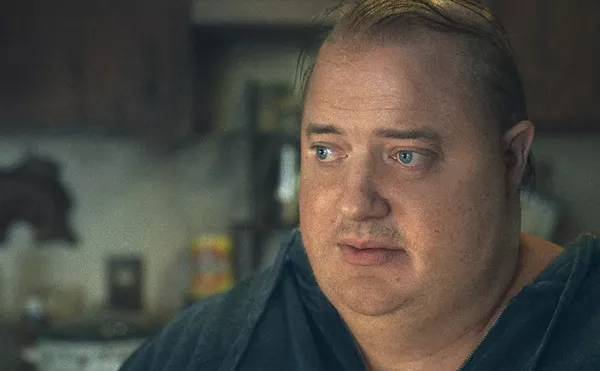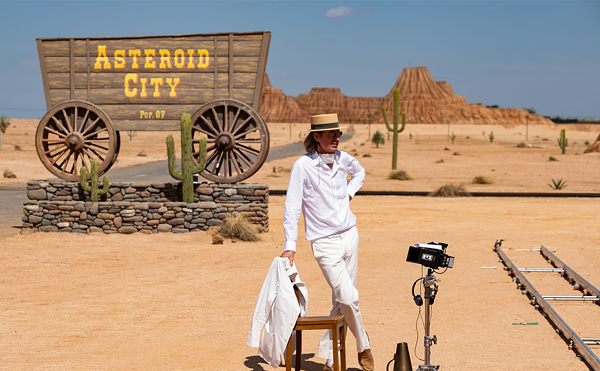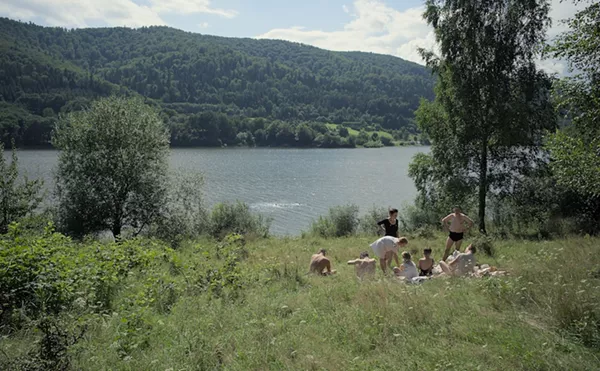As in years past, our local film festival offers too many films for one person to take in, too wide of a selection to fathom the "big picture." With 389 films to choose from this year, RFT staffers reviewed an eclectic selection of films based purely on what looked interesting and had an available screener. The festival-goer's best bet is to read the schedule carefully and take a similar leap of faith. You don't always know what to expect until it shows up on the screen.
Synonyms
Directed by Nadav Lapid
8:15 p.m. Friday, November 8 & 5:30 p.m. Sunday, November 10
Plaza Frontenac
Yoav, a young Israeli man played with deadpan innocence by Tom Mercier, wakes up in a Paris apartment with no possessions, no clothes and no clear idea of what he's going to do with himself. It's like he dropped in from outer space, not Israel. Trying to fit in, he resolves to no longer speak Hebrew, embracing the French language and spending hours reciting lists of words from his pocket Larousse. Almost immediately, Yoav becomes the center of attention for everyone from a young French couple to a mysterious security agency whose aims are as obscure as its methods. There's undoubtedly a political allegory at play in Synonyms, but the film also works as an absurdist spectacle, a contemporary Being There as written by Pinter or Beckett, supported by the considerable comic skills of the plain-faced Mercier. In one of its best moments, a starving Yoav takes to the dance floor, using an impromptu disco moment as an excuse to surreptitiously steal food. Comedy and despair mix in a Kafkaesque spin on Saturday Night Fever.
— Robert Hunt
Buñuel in the Labyrinth of Turtles
Directed by Salvador Simó
7 p.m. Saturday, November 9
Webster University Moore Auditorium
Luis Buñuel's relationship with truth and objectivity was intentionally complicated — as a surrealist, he considered himself a revolutionary in both art and politics. His films were intentionally provocative and met most often with shock and outrage. Buñuel in the Labyrinth of Turtles recounts the process by which Buñuel and his friend Ramón Acín created the film Las Hurdes, Tierra sin Pan (Land Without Bread), a semi-documentary portrait of the deeply impoverished Hurdano people of Spain, Buñuel's home country. Blocked by his own outrageous reputation from making another film in his usual outré style, Buñuel lucks out big when Acín wins the lottery and opts to produce his next film. They gather a team of four and travel to the interior of Spain, where the Hurdanos live in a state of such extreme privation that, the film claims, they don't even know what bread is. The subject is a seemingly odd one to animate. But one of animation's fundamental wonders is the sheer work involved in crafting every single frame by hand. Director Salvador Simó uses the medium as an extended and effective metaphor for the huge difficulties (and liberties) in creating Las Hurdes — like the animation, Las Hurdes is both factual and invented. Animation often implies a young audience, but definitely not for this film. Beside the fact that the subject would likely be terribly dull to the average kid, there are some images from Las Hurdes built into this film that are hard to look at and include several instances of actual violence to animals. As in the original, so in the retelling: We're talking about Buñuel here.
— Evan Sult
Kings of Mulberry Street
Directed by Judy Naidoo
12.30 p.m., Saturday, November 9 & 3 p.m. Sunday, November 10
Plaza Frontenac
Set among the Indian community in South Africa's Sugarhill district, Kings of Mulberry Street is an odd throwback to direct-to-video children's films of the 1980s in which an overweight, nerdy kid is taught to be cool by a cocky, street-smart partner, outsmarting all of the adults and uncovering some kind of villainous scheme in the process. This time around, the uncool one is shy over-parented Baboo, who unwillingly finds a mentor in Ticky, a Bollywood obsessed hipster whose dad is involved in a local crime gang. The young heroes are about as engaging as one can expect and older children may find it entertaining if they don't mind subtitles (and their parents don't mind ubiquitous adult language).
— Robert Hunt
Drag Kids
Directed by Megan Wennberg
6 p.m. Saturday, November 9
Stage at KDHX
Temper tantrums and tiaras abound in the documentary Drag Kids, which follows four kids from different parts of the world as they discover their passion for performance, drama and drag. Director Megan Wennberg shines a light on what it means to be a modern day drag queen and what it means to be a kid as the subjects build a friendship on their way to preparing for a group performance at the Montreal Pride Festival. Nine-year-old Nemis (Queen Lactatia), eleven-year-old Jason (Suzan Bee Anthony), and eight-year-old Stephan (Laddy GaGa), are joined by eleven-year-old Bracken, a young girl defining her own path in a scene that not long ago was a male-only form of expression. The lead up to their performance expresses the awkwardness of making friends and offers the warmth of discovering where you belong. Drag Kids captures the uncomfortable and exuberant moments that come along with following around a bunch of ten year olds.
— Caroline Groff
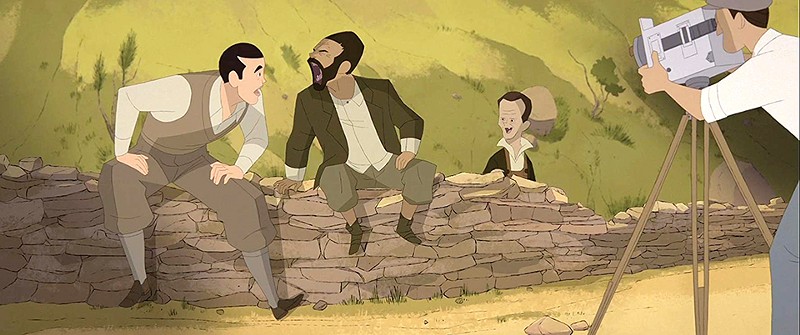
Curtiz
Directed by Tamás Yvan Topolánszky
7 p.m. Sunday, November 10
Webster University Moore Auditorium
Beginning with a credit sequence that looks like the opening of a James Bond film if one had been made in the 1940s, the preposterous Curtiz is a political fantasy set on the Warner Brothers lot in 1942, where Hungarian émigré Michael Curtiz struggles with family drama, government pressure and studio overrule as he directs Casablanca. Washington wants the film to promote the war effort; Curtiz just wants to be left alone (or at least free to pursue his many extra-marital interests). Filmed with pointlessly self-conscious camera movements (as if deliberately disassociating from classic Hollywood style), director Tamás Yvan Topolánszky tries in vain to be serious yet also archly ironic. Characters speak in wordy pronouncements amid a stream of historic clichés and anachronisms. One character has a drawing of Mr. Spock from Star Trek in a sketchbook, another speaks of "alternative facts," but there's no apparent reason for these history-challenged asides. The most embarrassing: Curtiz asks Hal Wallis why they couldn't cast Ronald Reagan in the film and is reminded that the actor is in the service, adding, "He told me he was going to make America great again."
— Robert Hunt
#Like
Directed by Sarah Pirozeck
8:30 p.m. Sunday, November 10
Tivoli Theatre
Set in the sleepy, washed-out woods of Woodstock, New York, #Like is the story of teenage girl Rosie, who grapples with the suicide of her younger sister Amelia, a victim of anonymous sexual harassment on a popular video chat website. On the first anniversary of Amelia's death, Rosie receives a message on her sister's online profile and realizes that her sister's tormentor is still at large. The film follows Rosie as she vows to get revenge on the person behind the anonymous account. She gradually becomes obsessed with a middle-aged construction worker who she is convinced is the man that ruined her sister's life. Rosie's slow, dark spiral is made all the more intense by a dizzyingly emotional performance from Sarah Rich. #Like is an atypical portrayal of integral social issues that women face within internet culture, and it digs painfully deep into the helplessness that inevitably follows death and loss, all while thrillingly subverting expectations. Viewers are kept on their toes up until the very final scene, left with the undeniable message that the internet (and those who misuse it) is an unconquerable and dangerous entity.
— Ella Faust
Hawaii
Directed by Jesús del Cerro
2:30 p.m. Tuesday, November 12 & 8:30 p.m. Saturday, November 16
Plaza Frontenac
This confused story of a Romanian cab driver trying to leave the country to collect an inheritance (from a deceased relative who had escaped to the titular island) has all of the ideological stereotypes and Cold War nostalgia: pompous party-line followers, evil bureau chiefs, bribe-hungry officials and unreliable black marketeers. Even the hero's romantic interest is ultimately placed under scrutiny. Likable performances and a strong sense of the real struggles of daily life in the days before the fall are ultimately outdone by stale characters, a smug, moralistic tone and an ending that makes it a coincidental companion piece to festival entry Balloon.
— Robert Hunt
Balloon
Directed by Michael Herbig
2:30 p.m. Wed., November 13, & 9:30 p.m. Fri., November 15
Plaza Frontenac
Balloon is the true story of two families who escaped from East Germany in 1979 by building a homemade hot air balloon (weak hearts in the "spoiler alert" camp will have to find a way to see the film without knowing the title). Their story was previously told in a 1982 Disney film, Night Crossing, but what a difference 27 years and the reunification of a major European country makes. In the Disney version, the protagonists are inspired to escape after seeing the arrest of friends whose son had tried to escape. They execute their plan under threat of discovery and the oppressive measures of the government. In this new telling, there's not a lot of political oppression or even a strong sense of any kind of ideology. The heroes are a Spielbergian nuclear family who never really say why they want to leave, and the film rushes into their plan without a lot of clues about what drove them to it. The father complains after a failed attempt that "Everything I've put my mind to has worked out," but the film leaves us guessing as to what those things — successful or otherwise — are. Family dynamics rule the day; a hint of a Romeo and Juliet romance between the teenaged son and the daughter of the party hack next door, a younger son resentful for not being informed of the escape and a toddler almost giving the plan away. It's hard to say who this film is for. Are there German audiences feeling nostalgic about the Bad Old Days? Balloon isn't a depiction of a footnote to Cold War history; it's a careful avoidance of it, reducing the original event to a celebration of family insularity.
— Robert Hunt




